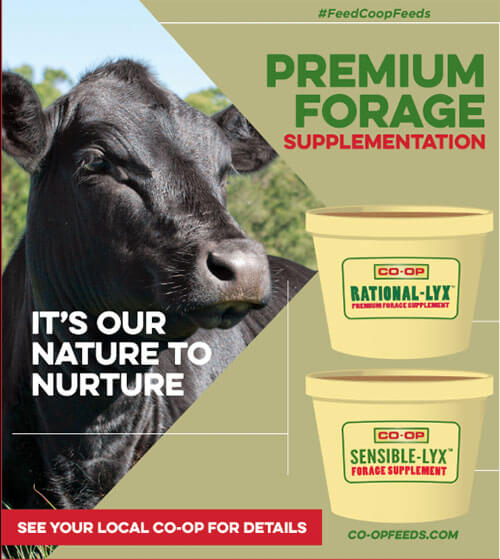Getting the Most From Poor Quality Hay
Jan 20, 2020

Stored hay tends to form the base of our winter beef cattle feeding programs in Tennessee. While considered a necessary commodity, increasing input costs make it an expensive one as well. Frequent rains and rapidly maturing forages in the spring can also mean at least a portion of our hay inventory is lacking in quality. Feeding this poor quality hay can result in decreased cattle performance and reduced profit for your beef cattle operation.
Being ruminant animals, cattle rely on the microorganisms that live in their digestive tracts to glean a great deal of nutrition from ingested forages. When supplementing cattle, consideration must be given to how the supplement affects rumen microorganisms. Effects can be positive, aiding the microbes in being more efficient and getting more nutrition from the forage. Conversely, supplementation with improper feedstuffs may produce negative effects and cause a decrease in forage utilization and feed efficiency. These all-important rumen “bugs” have requirements for minerals, nitrogen (protein) and carbohydrate energy. Supplementation programs and products should be selected to provide mutual benefits to the cattle and their rumen microorganisms, resulting in improved performance.
Co-op Sensible -Lix tubs are one way to provide a “boost” to these microbes without any negative effects. Such products typically consist of molasses, fat, protein from plant sources along with some non-protein nitrogen, and a limited amount of vitamins and minerals. Through different manufacturing processes these tubs are designed to limit intake and thus are considered “free-choice” supplements. Numerous research trials have proven that these products can improve intake of poor-quality hay and allow the animal to glean more energy from the hay consumed.
Co-op Sensible-Lix tubs are manufactured using a unique double mixing process which allows for lower moisture and higher TDN compared to other tubs in its class.
Convenience, 24-hour access, and resistance to weather are just some of the attributes of Co-op Sensible-Lix tubs. Let the beef cattle experts at your Co-op help you determine if molasses tubs are the answer to your winter supplementation needs.
Being ruminant animals, cattle rely on the microorganisms that live in their digestive tracts to glean a great deal of nutrition from ingested forages. When supplementing cattle, consideration must be given to how the supplement affects rumen microorganisms. Effects can be positive, aiding the microbes in being more efficient and getting more nutrition from the forage. Conversely, supplementation with improper feedstuffs may produce negative effects and cause a decrease in forage utilization and feed efficiency. These all-important rumen “bugs” have requirements for minerals, nitrogen (protein) and carbohydrate energy. Supplementation programs and products should be selected to provide mutual benefits to the cattle and their rumen microorganisms, resulting in improved performance.
Co-op Sensible -Lix tubs are one way to provide a “boost” to these microbes without any negative effects. Such products typically consist of molasses, fat, protein from plant sources along with some non-protein nitrogen, and a limited amount of vitamins and minerals. Through different manufacturing processes these tubs are designed to limit intake and thus are considered “free-choice” supplements. Numerous research trials have proven that these products can improve intake of poor-quality hay and allow the animal to glean more energy from the hay consumed.
Co-op Sensible-Lix tubs are manufactured using a unique double mixing process which allows for lower moisture and higher TDN compared to other tubs in its class.
Convenience, 24-hour access, and resistance to weather are just some of the attributes of Co-op Sensible-Lix tubs. Let the beef cattle experts at your Co-op help you determine if molasses tubs are the answer to your winter supplementation needs.